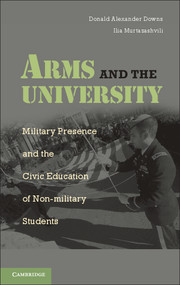Book contents
- Frontmatter
- Contents
- Tables
- Acknowledgments
- Part I A Normative and Pedagogical Framework
- Part II ROTC and the University
- 3 ROTC and the University
- 4 ROTC and the Ivies
- 5 ROTC and the Ivies
- 6 ROTC, Columbia, and the Ivy League
- 7 Post-DADT
- 8 Pedagogy and Military Presence
- 9 Winning Hearts and Minds?
- Part III Military History Examined
- Part IV Concluding Thoughts
- Index
- References
6 - ROTC, Columbia, and the Ivy League
Sisyphus Renews His Quest to Renew a Troubled Relationship
Published online by Cambridge University Press: 05 June 2012
- Frontmatter
- Contents
- Tables
- Acknowledgments
- Part I A Normative and Pedagogical Framework
- Part II ROTC and the University
- 3 ROTC and the University
- 4 ROTC and the Ivies
- 5 ROTC and the Ivies
- 6 ROTC, Columbia, and the Ivy League
- 7 Post-DADT
- 8 Pedagogy and Military Presence
- 9 Winning Hearts and Minds?
- Part III Military History Examined
- Part IV Concluding Thoughts
- Index
- References
Summary
Law professors have completely lost interest in legal control of the military, seemingly afflicted with a bad case of deference themselves. . . . We have an institutional obligation to participate in civilian control of the military. . . . There was a time when law school faculties carried enormous expertise about military law and military legal reform, and they were actually the first call that would be made when the military was sitting down and beginning to think about how it was going to reform its laws. Today, that would be the last call the military would make, because that expertise, over the last generation, really has evaporated.
– Diane H. Mazur, professor of law, and former captain, United States Air ForceIn this chapter, we look at the “return of ROTC” movement at Columbia and other Ivy schools. The chapter presents illustrative evidence of the gap that exists between elite universities and the military, and of a struggle to bridge that gap through the reintegration of ROTC with the campus. The story of the ROTC movement at Columbia highlights the tensions that exist between the value systems of the military and the university, as well as the potential for the finding of common ground that can hold its own amid differences.
Although the renewed politics of ROTC involves tangible benefits and consequences – offering scholarship and career opportunities for cadets, providing a fresh and different voice to campus discourse, bridging the civil-military gap, improving the officer corps, and so on – it is also an example of the “creedal passions” we talked about in Chapter 1 – the fundamental values and principles about which we, the people, feel most passionate. The ROTC debate pivots around such principles as civic equality, equal respect and dignity, freedom and diversity of thought, self-sacrifice and community, and commitment. It is partly a symbolic politics, which entails groups and individuals seeking policy goals in order to secure validation or recognition of their beliefs and values.
- Type
- Chapter
- Information
- Arms and the UniversityMilitary Presence and the Civic Education of Non-Military Students, pp. 161 - 197Publisher: Cambridge University PressPrint publication year: 2012



